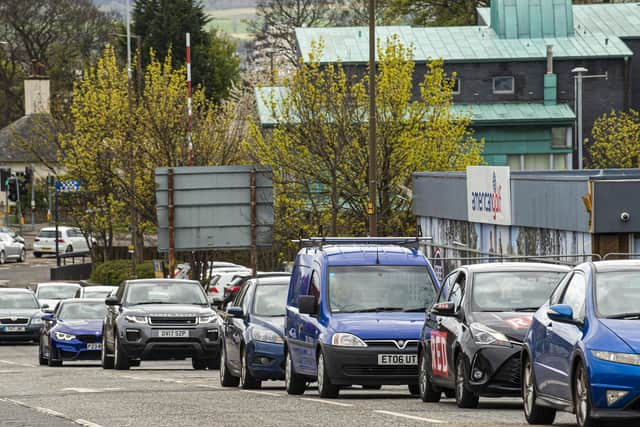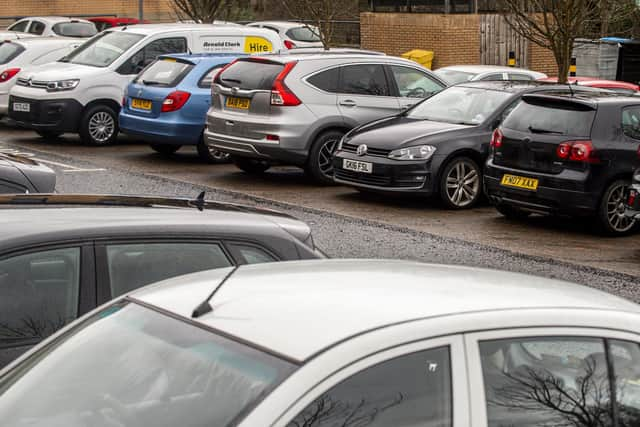Where does Edinburgh's election result leave plans for congestion charge, Low Emission Zone and Workplace Parking Levy?
and live on Freeview channel 276
Let us know what you think and join the conversation at the bottom of this article.
Transport issues from congestion to pollution to parking are likely to be among the top priorities for Edinburgh’s new administration following last week’s council elections.
The party manifestos featured some radical proposals to sort out the Capital’s problems, including an SNP proposal to charge motorists from outside the city driving in at peak periods. The SNP is the biggest party on the council with 19 seats, Labour has 13, the Lib Dems 12, Greens 10 and Tories nine.
Advertisement
Hide AdAdvertisement
Hide AdSo what does the outcome of the election tell us about what is likely to happen with plans for a congestion charge, the Low Emission Zone and Workplace Parking Levy?
Congestion charge
It looks as if the SNP might not win enough support to be able to introduce its proposed congestion charge.
The idea was put forward in the party’s Edinburgh manifesto for the elections. They say it would be a flat rate charge of around £2-£3 a day, applying at peak times only and only paid by people who live outwith Edinburgh bringing their vehicle across the city boundary. The purpose would be to encourage commuters to switch from car to public transport, but also to raise revenue which the SNP says would then be invested in improving public transport not just in the Capital but across the region.


The plan has been criticised by leaders of other Lothian councils who were not consulted and say their residents are being unfairly targeted. They argue public transport from many parts of the region into Edinburgh is not good enough to provide a viable alternative to the car. And businesses have said an extra levy is the last thing they need at a time when other costs are rising.
Advertisement
Hide AdAdvertisement
Hide AdThe Greens’ Edinburgh manifesto pledges include consulting on and introducing a congestion charging scheme, but does not spell out details. The party, however, is thought to have serious reservations about the SNP scheme. Midlothian Greens have described the SNP proposal as "unfair and undemocratic" because it imposes the charge only on non-Edinburgh residents, without consultation. They argue congestion is caused by vehicles travelling within Edinburgh’s city limits as well as those coming from surrounding areas and say any congestion charge should be considered as part of a regional transport policy, with proper consultation.
Labour has been fairly non-committal on the idea of a congestion charge, but its manifesto stresses the need to work with neighbouring local authorities and business on such issues and emphasises improving public transport and increasing park and ride sites.
It is not entirely clear if the council would need the approval of ministers before it could introduce a congestion charge as proposed. It was an eye-catching idea in the manifesto, but will need to be developed further if it is to have a chance of being approved.


Didn't Edinburgh try this before?
A proposal for a congestion charge was put to a referendum in Edinburgh in February 2005 and was defeated by three to one. The plan then was for two cordons, one around the city centre and one just inside the city bypass, both operating Monday-Friday. The inner cordon was going to apply from 7am to 6.30pm, while the outer one would only be in force during the morning rush hour, from 7am to 10am. Motorists would have been charged for crossing either cordon but would have paid only one charge per day even if they crossed the cordons several times. Turn-out in the referendum was 61.7 per cent and the scheme was decisively thrown out by 74.4 per cent to 25.6 per cent. There is no mention of a referendum this time.
Low Emission Zone
Advertisement
Hide AdAdvertisement
Hide AdThe ban on the the worst-polluting vehicles entering the city centre has already been agreed by the council and all it needs now is formal approval from the Scottish Government.


The Low Emission Zone is scheduled to be introduced at the end of this month, but will not be enforced for two years – a "grace period" to allow drivers to adjust to the changes.
All motor vehicles, except motorcycles and mopeds, will have to meet a minimum emissions standard to enter the zone and those which fail to meet the standard will be banned. There are certain exemptions, including for blue badge holders and emergency vehicles.
The ban will affect diesel cars registered before September 2015 and petrol cars registered before January 2006 – an estimated 20,000 vehicles in and around the Capital – as well as heavy goods vehicles and buses that do not meet the Euro VI emission requirements.
Advertisement
Hide AdAdvertisement
Hide AdNo further decisions are required before the ban comes into force in June 2024, although the Greens will be keen to ensure the emission standards are updated in line with stricter guidelines as they emerge.
Workplace Parking Levy
Plans to charge employers for the parking spaces they provide for staff could face a struggle to be approved by the new council.
The SNP and the Greens are firmly in favour of the move, but although Labour in Edinburgh previously backed the idea, it has now accepted the party's national stance against the Workplace Parking Levy. The Tories are strongly opposed and the Lib Dem manifesto acknowledged "strong and differing arguments" and promised to consult.
The SNP’s workplace parking levy proposal is expected to be that companies with over 50 parking spaces should be required to pay around £500 a year per space. The party has spoken of imposing conditions to make sure the cost was not passed on to employees. It says the levy would encourage large businesses to take responsibility for how employees were getting to and from work, as well as bringing in revenue to be invested in public transport.
But unless the Lib Dems can be persuaded to back the plan or Labour returns to supporting it, there would not be enough votes to pass it.
Comment Guidelines
National World encourages reader discussion on our stories. User feedback, insights and back-and-forth exchanges add a rich layer of context to reporting. Please review our Community Guidelines before commenting.